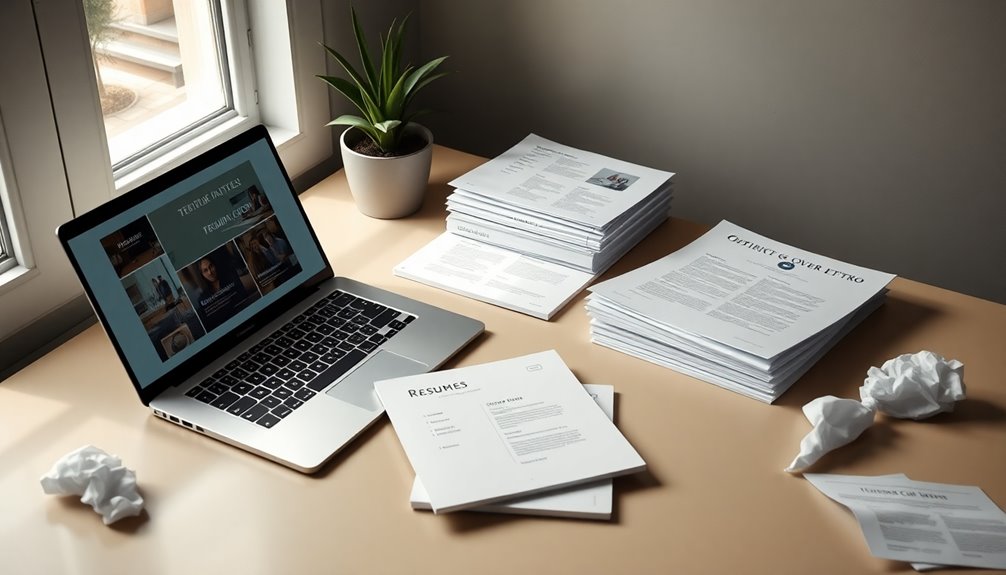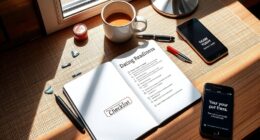To craft a compelling interview portfolio, start by curating a collection that showcases your skills and experiences. An updated resume is essential, highlighting your relevant achievements. Include work samples that demonstrate your abilities in action, along with certifications that add credibility. Organize your portfolio clearly for easy navigation and tailor it to align with specific job requirements. Don't forget to rehearse your presentation, using eye contact and storytelling to engage interviewers. Regularly update your portfolio as you grow professionally. Discover more techniques and tips that'll help you make a lasting impression in your interviews.
Key Takeaways
- Select a suitable medium, such as a website or printed document, to effectively showcase your work and experiences.
- Organize your portfolio with clear sections, making it easy for employers to navigate and find relevant information.
- Tailor your content to align with the specific job requirements, highlighting achievements that demonstrate your skills.
- Regularly update your portfolio with new skills and accomplishments to reflect your growth and maintain credibility.
- Prepare for the presentation by rehearsing delivery, using engaging body language, and being ready to answer questions.
Understanding Interview Portfolios

When it comes to job hunting, an interview portfolio can be your best ally in showcasing your skills and experiences.
It's a curated collection of your best work, and it can take many forms, like a website, presentation, or printed documents. While often associated with creative fields, such as writing and design, it's equally valuable for non-creative professionals.
You can include reports, achievements, and any relevant documentation that highlights your qualifications. The purpose of this portfolio is to visually represent your career accomplishments, making it easier for potential employers to see what you bring to the table.
A well-organized portfolio enhances your presentation and sets you apart from other candidates, giving you a competitive edge in the job market.
Significance in Job Applications

An interview portfolio plays a significant role in job applications by providing concrete evidence of your skills and experiences.
It not only showcases your qualifications but also sets you apart from other candidates. Here are three key reasons why it matters:
- Tangible Evidence: It offers real examples of your work, making your claims more credible.
- Professionalism: A well-crafted portfolio reflects your attention to detail and commitment, demonstrating your enthusiasm for the role.
- Confidence Booster: Having organized materials at hand helps you feel prepared and confident during interviews, allowing you to focus on engaging with the interviewer. Moreover, a strong portfolio can highlight your leadership skills that impress employers, further enhancing your appeal as a candidate.
Incorporating a strong interview portfolio into your job applications enhances your chances of making a lasting impression and landing the job you want.
Key Portfolio Components

What makes a compelling interview portfolio? Key components include an updated, tailored resume that highlights your most relevant experiences.
Include work samples that showcase your best projects or assignments, demonstrating your skills in action. Relevant certifications or licenses should also be featured, adding credibility to your qualifications.
Don't forget a list of professional references who can endorse your work ethic and capabilities. A personal statement succinctly outlining your career goals and aspirations adds a personal touch.
Additionally, incorporating awards, recommendations, and positive statements from previous employers can greatly strengthen your portfolio. These elements together create an all-encompassing picture of who you are, making it easier for potential employers to see your value. Emphasizing data-driven decision-making in your portfolio can also help demonstrate your strategic mindset and adaptability in various situations.
Steps for Effective Creation

To create an effective interview portfolio, start by selecting a medium that best showcases your work, whether that's a professional website, a digital presentation, or a well-organized printed document.
Next, focus on these essential steps:
- Organize Your Content: Structure your portfolio with clear sections for your resume, work samples, and certifications. This helps employers navigate easily.
- Tailor Your Items: Align your selected work samples with the job requirements to demonstrate relevance. Highlight your achievements.
- Regularly Update: Keep your portfolio current by adding new skills, projects, and accomplishments. An updated portfolio reflects your growth and enhances your content quality which can improve your credibility in the eyes of potential employers.
Presentation Techniques

Effective presentation techniques can greatly enhance how you share your interview portfolio. Start by rehearsing your delivery; practice discussing each item confidently and clearly.
Engage your interviewer with eye contact and positive body language, creating a connection that fosters interest. When presenting, be concise—focus on key achievements and skills that align with the job.
Prepare for potential questions about your portfolio items, and use storytelling to illustrate your experiences and their relevance. This approach not only captivates your audience but also showcases your communication skills.
Remember to tailor your presentation to the specific role, highlighting experiences that resonate with the job requirements. A well-presented portfolio can leave a lasting impression and set you apart from other candidates. Additionally, consider discussing the ethical implications of AI in your portfolio if relevant, as this is increasingly important in today's job market.
Common Pitfalls to Avoid

While showcasing your interview portfolio, it's important to be mindful of common pitfalls that could hinder your presentation. Avoiding these mistakes will help you present your work effectively:
- Neglecting Design: A cluttered or unprofessional layout can distract from your accomplishments. Keep it clean and visually appealing.
- Inconsistency in Formatting: Guarantee uniformity in font sizes, colors, and styles. Consistency reflects attention to detail and professionalism.
- Failure to Customize: Tailor your portfolio for each interview. Highlight relevant skills and experiences that align with the specific job you're applying for.
- Overlooking Audience Engagement: Consider how to incorporate audience engagement strategies in your presentation to make a lasting impression.
Continuous Improvement Strategies

Focusing on continuous improvement strategies for your interview portfolio helps you stay relevant and competitive in the job market. Regularly assess your portfolio's effectiveness by seeking feedback from peers and mentors. Update your work samples to reflect your most recent achievements and skills. Additionally, ensuring emotional regulation in your interactions can greatly enhance your confidence during interviews.
Here's a table to visualize key strategies:
| Strategy | Action Items |
|---|---|
| Gather Feedback | Ask trusted peers for their opinions |
| Update Regularly | Refresh content quarterly |
| Align with Job Trends | Research industry demands and adjust |
| Showcase New Skills | Add recent certifications or projects |
| Reflect and Adapt | Review performance post-interviews |
Frequently Asked Questions
How Long Should an Interview Portfolio Be?
Your interview portfolio should be concise yet thorough, ideally spanning 10 to 15 pages or the equivalent if digital.
Focus on quality over quantity; include only your best work that aligns with the job you're applying for.
Each section should clearly showcase your skills and experiences without overwhelming the reader.
Remember to tailor content for each interview, ensuring relevance and clarity to make a strong impression on potential employers.
Can I Include Personal Projects in My Portfolio?
Absolutely, you can include personal projects in your portfolio!
They showcase your skills, creativity, and passion, giving potential employers insight into your abilities beyond professional experiences.
Just make sure these projects are relevant to the position you're applying for.
Present them clearly, highlighting what you accomplished and the skills you utilized.
Personal projects can set you apart and demonstrate your initiative, making your portfolio even more compelling.
Should I Include a Cover Letter With My Portfolio?
Think of your portfolio as a puzzle; a cover letter can be the final piece that completes the picture.
Yes, you should include a cover letter with your portfolio. It introduces you, sets the tone, and provides context for your work.
This personal touch allows you to express your enthusiasm and explain how your skills align with the job. Tailor it to each opportunity, and let your personality shine through!
How Often Should I Update My Portfolio?
You should update your portfolio regularly, ideally every few months or whenever you complete a significant project. This keeps your work fresh and relevant, showcasing your latest skills and achievements.
When you gain new certifications or awards, add those too. Regular updates not only reflect your growth but also show potential employers that you're proactive and committed to your professional development.
Don't wait until you need it for an interview; stay prepared!
Is It Necessary to Print My Portfolio for Interviews?
Did you know that 85% of hiring managers prefer seeing a candidate's work firsthand?
While it's not strictly necessary to print your portfolio for interviews, having physical copies can be advantageous.
It allows you to engage directly with your work, making it easier to discuss specific pieces.
Plus, a well-organized printed portfolio showcases your professionalism and preparedness, leaving a lasting impression.
Just guarantee it's tailored to the job you're applying for!
Conclusion
In today's job market, a well-crafted interview portfolio can set you apart, with studies showing that candidates with portfolios are 60% more likely to land an interview. By showcasing your skills and accomplishments visually, you not only impress potential employers but also demonstrate your commitment to your profession. Remember, your portfolio is a living document—continually update it to reflect your growth. So, take the time to create a standout portfolio that truly represents you!
Eugene brings a fresh, dynamic voice to our platform as one of our talented Writers. Specializing in research-driven content, he explores the latest findings in psychology and personal growth, translating them into actionable insights for our readers. Eugene’s work is fueled by a curiosity about what makes us tick and a desire to help others unlock their potential.










